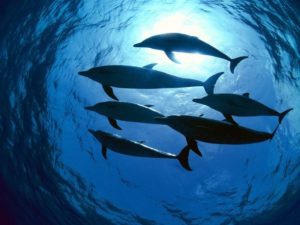The research from more than 250 scientists also highlighted the risk of knock-on effect up the food chain.
Increased acidity in the oceans, called by some the “evil twin of global warming”, compounds the effect of rising temperatures.
Acidification is a change in the ocean chemistry that occurs when carbon dioxide from the atmosphere dissolves in seawater.
Currently, around 30% of the carbon dioxide put into the atmosphere by humans dissolves into the seas.
The eight-year study by German research network Bioacid (Biological Impacts of Ocean Acidification) found that infant sea creatures will be especially harmed.
It also found that the number of cod growing to adulthood could fall to a 12th of the current stock by the end of the century.
Professor Ulf Riebesell, Helmholtz Centre for Ocean Research, said: “Even if an organism isn’t directly affected by acidification, it may be affected indirectly through changes to its habitat or food chain.”
He said the only way for acidity levels to change is to “quickly” reduce the level of carbon dioxide emissions globally.
“Co2 emissions have to be reduced both for oceans and for climate change, they are two sides of the same coin” he added.
The study will be presented later this month at a UN climate conference in Bonn, Germany.
It comes as Sir David Attenborough called for a global deal to tackle over fishing.
“The sea is being hit in three different ways,” said.
“There’s nothing which we, or anybody listening to this, can do much about the raising of the temperature because the die is already cast.
“But we can do something about what we tip into the sea – there are some tragic stories to be told as to the effect this is having, not only to the creatures that live in the sea, but by the sea.”
On overfishing, he said: “What you need is international agreements to deal with that.
“There is a precedent. The fishing nations of the world got together some years ago and decided that whales were on the way out because they were being hunted so intensively and agreed on a policy to stop hunting whales commercially, except for a very few exceptions.”
:: Sky has been running a campaign to make people more aware of the effect plastic has on the world’s oceans and to share ways of tackling the problem. To get involved in Sky Ocean Rescue, visit the campaign website here. You can also watch our documentary, A Plastic Voyage
 Increased acidity in the oceans could affect many species including molluscs and corals, an eight-year study has found.
Increased acidity in the oceans could affect many species including molluscs and corals, an eight-year study has found.




